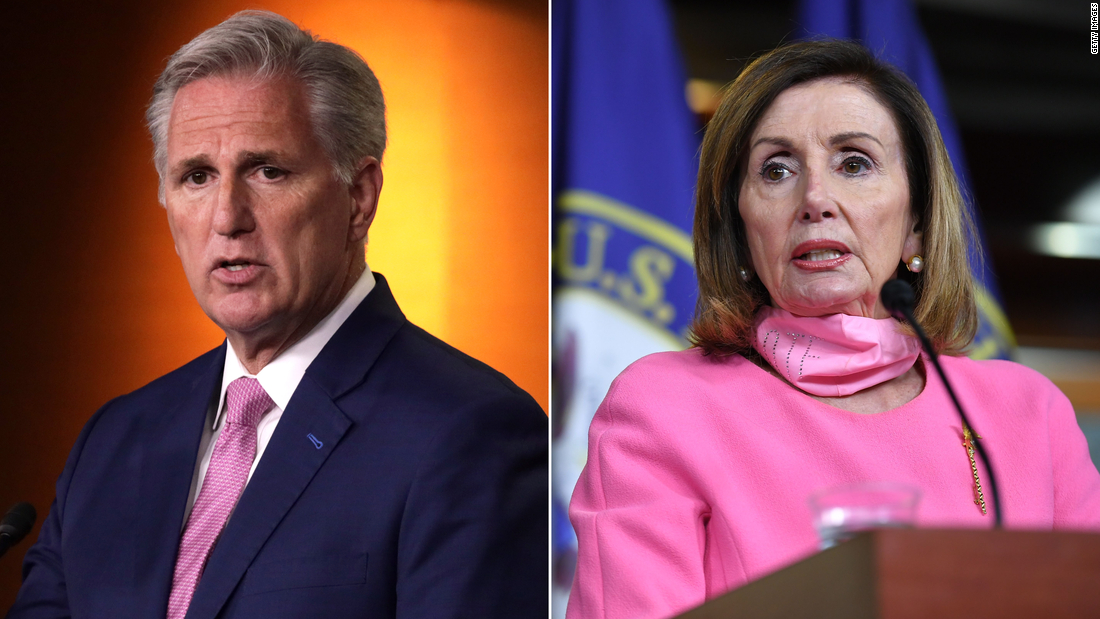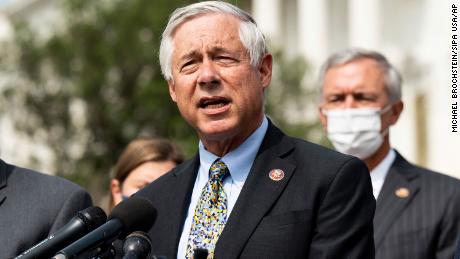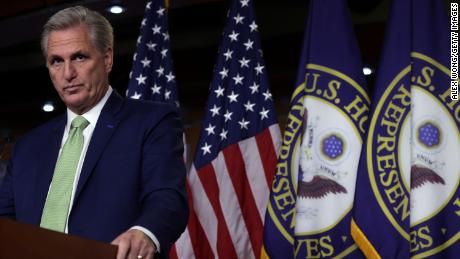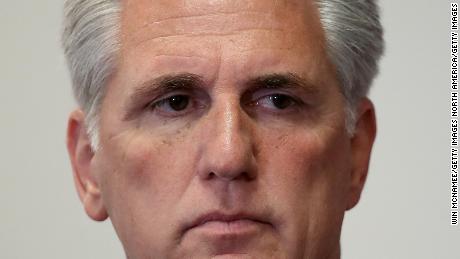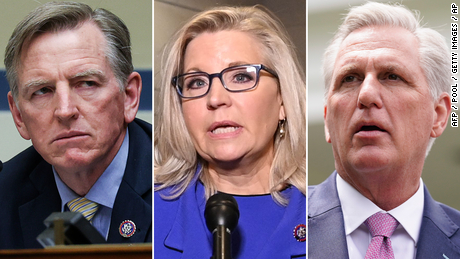All eyes on how many GOP defections will there be as House set to vote on bipartisan bill to create commission
The bill is expected to pass through the Democratically controlled House on Wednesday evening. But the margins are an important indicator because just how many House Republicans are willing to buck their party leadership may offer an early signal for how many GOP senators could back the bill. Supporters of the plan will need at least 10 Republicans in the Senate to join all 50 Democrats in the chamber in order to overcome a 60-vote filibuster and pass the bill.
Senate Minority Leader Mitch McConnell told Republicans on Wednesday he is opposed to the bill, according to a GOP source familiar.
In the latest sign that House Republican leadership wants the conference united behind McCarthy’s opposition, Minority Whip Steve Scalise’s office sent a letter to members informing them that the leadership was now advocating Republicans vote against the legislation, which was a reversal from GOP leadership’s previous position to not lobby their members on the measure.
With the fate of a January 6 commission soon resting in the hands of Senate Republicans, Senate Majority Leader Chuck Schumer criticized McCarthy’s decision to not support the 1/6 commission bill but promised on Tuesday that the legislation will get a vote in the Senate.
“This shows how difficult it is to negotiate with Republicans. If the Republican leaders are just going to throw their lead negotiators under the bus, why do they even participate in negotiations at all?” Schumer posed. “We’ll see what the House vote is like, but I want to be clear, I will put the January 6 commission legislation on the floor of the Senate for a vote. Period.”
The bill lawmakers will vote on would create a 10-person commission, with each party getting an equal number of appointments and subpoena power, a key provision that McCarthy had said he wanted early on in negotiations. The legislation tasks the panel with examining “the facts and circumstances of the January 6th attack on the Capitol as well as the influencing factors that may have provoked the attack on our democracy.”
McCarthy announces opposition Tuesday
In a statement announcing his opposition to the deal, McCarthy accused Pelosi, a California Democrat, of failing to negotiate in good faith, argued that a commission would get in the way of investigations already underway and said any commission needed to look at episodes of political violence beyond January 6.
“Given the political misdirections that have marred this process, given the now duplicative and potentially counterproductive nature of this effort, and given the Speaker’s shortsighted scope that does not examine interrelated forms of political violence in America, I cannot support this legislation,” McCarthy said.
Pelosi responded to McCarthy’s opposition to the deal in a statement by saying, “Democrats made repeated efforts to seek a bipartisan compromise. But Leader McCarthy won’t take yes for an answer.”
Despite McCarthy’s opposition, Katko told reporters on Tuesday that he still believed the bill was a good deal.
“I appreciate that he’s allowing us to vote the way we want to vote, and I appreciate him respecting the fact that we brought the bill to a good place. And not everyone is going to agree on every bill,” Katko said.
When pressed on McCarthy’s opposition, Katko pushed back, arguing, “I’m not sure he said it was a bad deal, but he doesn’t ultimately support it, and that’s fine. It’s his prerogative, but he’s allowing it to go forward and we are going forward with it. And that speaks volumes of him as a leader.”
Katko said he did not know that he did not have McCarthy’s support when it was first announced that a deal had been reached last week but said, “It doesn’t matter.”
“People can disagree, but I appreciate the way he’s handled this and he’s appreciated the way I’ve handled this,” he said.
Democratic leaders seek bipartisan support
House Majority Leader Steny Hoyer told reporters that he believes the legislation to establish an independent January 6 commission will pass on a bipartisan basis and that he has spoken to “many Republicans” who support the agreement reached by Thompson and Katko.
The Problem Solvers Caucus, a group of 29 Democratic and 29 Republican House lawmakers who include Katko, said in a news release late Tuesday that the group endorses the bill.
But McCarthy’s opposition has left many rank-and-file Republicans undecided about where they stand.
Rep. Rodney Davis of Illinois, the top Republican on the House Administration Committee, said his staff was “still looking at it.”
“We are going to determine how similar it is to the bill we co-sponsored together and what changes they made, and I will make a decision as we move forward,” Davis said.
Asked how McCarthy’s own decision impacted his, Davis said, “Every decision everyone makes impacts every decision we make.”
Rep. Don Bacon, a Nebraska Republican who’s a member of the Problem Solvers Caucus and told CNN he will support the bill, commented on how McCarthy’s opposition to the legislation is affecting members.
“People aren’t sure what they’re doing on this. I think they’re still debating it,” Bacon said.
On whether he thinks McCarthy coming out against the bill will sway his Republican colleagues, Bacon predicted, “It may.”
Several Republicans have echoed McCarthy’s concerns about the narrow scope of the commission in explaining their opposition in the lead-up to the vote.
Rep. Tom Cole of Oklahoma told CNN, “I’m not pleased with what I’ve seen so far,” adding, “though I got to compliment both the chairman and the ranking member. They worked hard, but I’d like to see something more expansive than we’ve seen.”
Republicans who voted to impeach Trump show support for commission
Rep. Anthony Gonzalez of Ohio, another of the 10 Republicans who voted to impeach Trump, outlined why he is supporting the bill.
“I think it’s necessary just given what actually happened on that day and all the buildup. I think it’s important that you know when the country and the Capitol is attacked that way that we take a full accounting and figure out how to prevent it going forward,” Gonzalez said.
Bacon, in explaining why he will support the legislation, told CNN, “We should know why security was ill prepared and broken that day.”
“We cannot let fear stop us from doing what is right. This week, I will proudly vote in support of the bipartisan January 6th commission and hope it is successful in shedding light on the truth,” the Illinois Republican said in a statement.
But the Republican split in the House over the January 6 commission legislation has led to further confusion in the Senate.
Senate Minority Whip John Thune predicted Monday that the Senate would pass a bill to establish a commission probing the January 6 attack “in some form,” but changed his tune on Tuesday when it became clear that House Republicans were not in sync on the legislation.
“It’s a little more uncertain, I would say now,” the South Dakota Republican said when asked about opposition from McCarthy as well as other members of the Senate GOP leadership team.
“When the leader over there comes out in opposition to it — my understanding was they had it kind of worked out, Republicans and Democrats were going to join together on this based on the changes that had been made,” Thune said. “But if that’s not the case, that certainly could affect the way people over here view it.”
This story and headline have been updated with additional developments Wednesday.
CNN’s Manu Raju, Lauren Fox, Jeremy Herb and Ryan Nobles contributed to this report.
![]()


